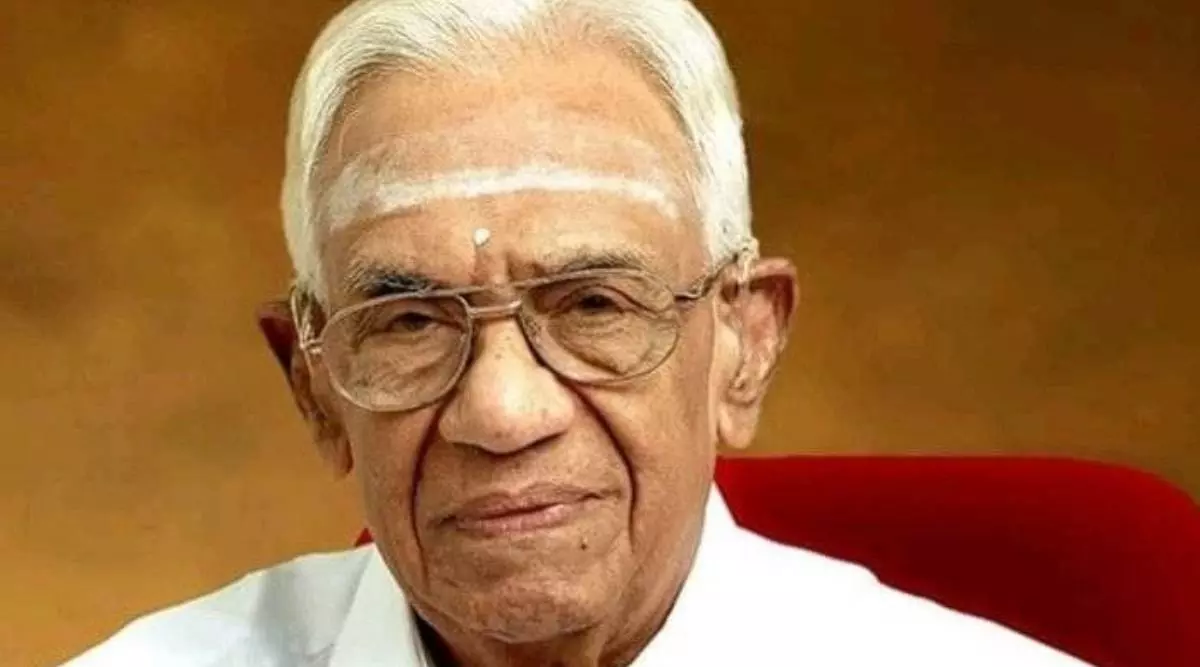
The man who left unerasable footprints
text_fieldsThe doyen of Ayurveda has bidden his final farewell; the one who contributed to the world at large Kerala's glory in the stream of India medicine, Panayambally Krishnakutty Warrier (PK Warrier) left a void after an eventrul centyru-long life as of a world citizen. Although he leaves behind deeds and knowledge for centuries, for now there is no substitute in sight for him. Madhyamam pays tributes to the stalwart who led six and a half decades of service glowing with far sight and dedication in the cause of ayurveda. We mourn his death and share the deep sorrow of his family and colleagues.
The singular credit of PK Warrier is that he spread worldwide the stream of medicine that would have been confined to Kerlala coast. The humble clinic that was started about 120 years ago in Kottakkal in Malappuram district as 'arya vaidyasala', is what now stands as a towering institution with branches all over the world and as a top research centre. Even historically this movement of arya vaidyasala has its own significance. When occupying forces deliberately ditched indigenous knowledge and medical streams, the founders of the said clinic had a goal of countering that move. In fact, the different currents of renaissance rooted in anti-occupation stream, did influence this discipline too. In parallel did happen a reform-oriented move to break the barriers of stagnant customary medicine. That is why under the leadership of Vaidyaratnam PS Warrier, an anti-cholera drug was developed and distributed all over the country free. Although PK Warrier also, in his adolescence plunged into this path of service which the time demanded, he deviated briefly to a different track: during the Quit India stir, he left his studies and joined the freedom fighters. His role involved delivering secret messages to leaders in hiding and in anti-British propaganda. Thus for some time he got engaged in the path of revolution during which he came into emotional bonds with several national leaders too. Perhaps that was when he recognised through such contacts that there lay another path of revolution in the conventional domains of knowledge. Probably that inspired him to make a detour to the study of Indian medicine.
Malayalam writer MT Vasudevan Nair once said about PK Warrier: I have never seen another person with this much of capability for action; a great soul endowed with a vision that can be called philosophic. With the death of his brother P Madhava Warrier, PK Warrier took charge of the institution as Trustee and ever since then that philosophical insight can be seen to have guided every step of the centre. Each step of growth of that institution stemmed from his search for ways of modernising it with the help of modern science and technology. That was the mantra through which a mere indigenous treatment centre was converted into a world-class moden centre of research. Due to this reason, he did not keep away from any stream of medicine including modern medicine. In whichever way modern medicine got tied to physics, chemistry and bio-technology and benefited from them, he adopted an ayurvedic approach in the same model, and implemented it systematically too. It may be recalled that WHO had an action plan falled Alma Ata Declaration which had its slogan of 'Health for All'. One of its agenda was to use the possibilities of all streams of medicine to their utmost. PK Warrier was one of the prominent health care champions who embraced that declaration. As part of that campaign, he travelled in different parts of the world and held classes. It was through such tours that ayurveda won so much currency and acceptance.
Another alternative branch of treatment that won similar acceptance is acupuncture. But as opposed to acupuncture which in China, enjoyed government support with years of campaign it chalked out for its popularisation, in the case of PK Warrier it was a one-man crusade. Dr Warrier for whom ayurveda was a mission did not see it as a mere form of treatment, but rather as a way of life and culture. And throughout his life he spent his time and energy to get ayurveda accepted so. In that sense, he made the land called Kottakkal not only the Mecca of ayurveda, but even a great cultural centre. That is how the functions of PSV dance troupe and other artistic outfits have to be assessed. All his secular and progressive thoughts and approach added value to such cultural enterprises. Thus the place of PK Warrier who gifted a great 'health model' through such multi-faceted activities, will no doubt be beside the architects of the new Kerala. The footprints of this paragon of intellect and action will no doubt remain etched as memories of an era.























